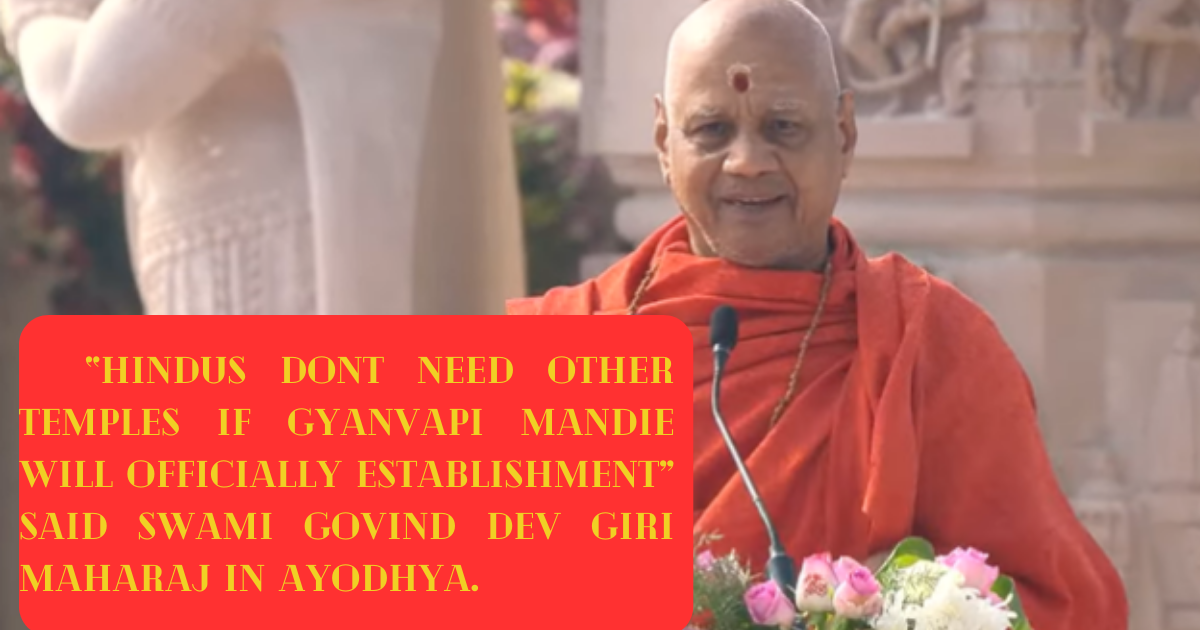Healing Historical Wounds: Hindus will stop after establishment of Gyanvapi Mandir

Mandir hidden under mosque:
It’s the most historical fact now that some Mughals specially Aurangzeb have in their rule demolished Mandirs and build mosque over them – now when we are digging the historical truth Archeological surveys, research of historians, experts, scholar and professors – Hindus claim to build Mandir’s as it is connected with their deep-rooted spiritual belief’s. As a result we have seen after the battle of 500 years – finally Ram returned to Ajodhya to his Janm sthan with building of Ram Mandir over Babri Masjid was stood once. Another Mandir that has same promontancy as Ram Manadir for Hindus is Gyanvapi Mandir- another historical significant place for Hindu community in Kashi Vishwanath – Now its natural they want Gyanvapi Mandir to establish over Gyanvapi Mosque.
History of India – A long debate:
Today, people still feel upset about things that happened a long time ago, which makes it hard for different groups to get along. One big issue is about places that are important to different religions, and who should control them. This has made a lot of people think about how we can all understand each other better and live together peacefully.
The arguments over these places go back a long time in India’s history. They are places where different religious groups both believe they should have control. This has made many people think deeply about how we can solve these problems and make things better between different communities.
At the heart of this discourse lies the Gyanvapi mosque in Varanasi, standing adjacent to the revered Kashi Vishwanath temple, and the Mathura mosque, nestled close to the Krishna Janmabhoomi temple. These sites, embroiled in legal battles and historical debates, symbolize not just architectural structures but also the complex interplay of faith, identity, and heritage.
Establishment of Gyanvapi is way to spread harmony
The recent developments surrounding these sites have reignited fervent conversations about the need for amicable resolutions. The call from figures like Govind Dev Giri Maharaj, the treasurer of Sri Ram Janmabhoomi Trust, for peaceful negotiations underscores a yearning for closure and communal harmony. Maharaj’s plea for relinquishing claims over these mosques in exchange for peace exemplifies a profound desire to transcend the shackles of the past and embrace a shared future.
Judiciary emerges as a crucial arbiter
Amidst these deliberations, the role of the judiciary emerges as a crucial arbiter, tasked with navigating to solve the maze of legal intricacies and historical narratives. The Varanasi court’s decision to allow puja inside one of the cellars of the Gyanvapi mosque, albeit contentious, reflects an attempt to address grievances while upholding the principles of justice and religious freedom.
It is a matter goes beyond legality:
Yet, beyond the legal realm, lies the realm of human emotion and collective memory. The scars of history run deep, evoking pain and anguish for those whose ancestors witnessed the desecration of sacred sites. The sentiments expressed by Shri Ram Janmabhoomi Teerth Kshetra chief priest Acharya Satyendra Das expressed the emotional resonance of these disputes, urging for healing and reconciliation as the antidote to intergenerational trauma.
In the pursuit of peace, dialogue becomes paramount. It is through dialogue, empathy, and a willingness to acknowledge each other’s perspectives that the seeds of reconciliation can be sown. The acknowledgment of past injustices coupled with a shared commitment to building a future grounded in mutual respect and understanding holds the promise of a brighter tomorrow.
As we navigate deep into history, let us not be bound by the chains of resentment and animosity but rather, let us forge a path illuminated by the beacon of compassion and reconciliation. The quest for peace amidst religious disputes is not merely a legal or political endeavor but a moral imperative, resonating with the timeless wisdom of embracing love over hate, forgiveness over bitterness, and unity over division.
In the crucible of adversity, may we find the courage to transcend our differences and embrace our common humanity. For in the end, it is not the monuments we leave behind but the legacy of compassion, understanding, and harmony that truly defines us as a civilization.